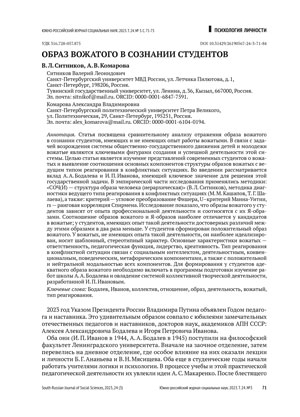Abstract
The article presents a comparative analysis of the reflection of a group leader’s image in students with and without a group leader’s experience. In connection with the goal of revitalizing the system of nationwide movement of children and youth, group leaders are the key figures in the creation and successful operation of this system. The aim of the article is to examine modern students’ ideas about group leaders and to find out the correlation between the main components of the group leader’s image structure and the group leader’s type of response in conflict situations. The introduction reviews the contribution by A. A. Bodalev and I. P. Ivanov, which is crucial for solving this state task. In the empirical part of the research the following methods were used: ‘SOCH(I) — structure of human image (hierarchical)’ (V. L. Sitnikov), the method of diagnosing the leading type of reaction in conflict situations (M. M. Kashapov, T. G. Shalaeva), as well as the following criteria: Fisher’s angular transformation, Mann-Whitney U-criterion, and Spearman’s rank correlation coefficient. The study found that students’ perceptions of a group leader are influenced by their professional experience and are related to their self-images. The correlation between a group leader’s images and their self-images varies greatly among candidates for leadership. In students with experience in this activity, there are half as many reliable differences between these images. Students have formed a positive image of a group leader. Inexperienced group leaders often have an idealized and stereotypical view of their role in the group. The main characteristics of group leaders are to take responsibility, to teach, to lead, and to create. The response type in a conflict situation is linked to social intelligence, activity, conventionality, behavior, and metaphorical components, as well as the positive and neutral modality of all image components. To develop a comprehensive understanding of a group leader among students, it is necessary to include studying the works of A. A. Bodalev’s school and mastering the system of collective creative activity of I. P. Ivanov into training programs.
Keywords
References
- Bodalev, A. A. (1988). Psikhologiya o lichnosti [Psychology about Personality] Moskva: Mosk. un-t.
- Bodalev, A. A. (1995). Lichnost’ i obshhenie [Personality and Communication]. Moskva: Mezhdunarodnaya pedagogicheskaya akademiya
- A.A. Bodalevu – 70 let [A.A. Bodalev is 70 years old]. (1993). Voprosy psikhologii [Questions of Psychology], 3, 114.
- Ivanov, I.P. (2019). Tvorcheskoe sodruzhestvo pokoleniy kak uslovie vospitaniya yunykh obshhestvennikov [An Inter-generational Creative Community as a Precondition for Educating Young Social Activists]. In Pedagogika kollektivnoy tvorcheskoy deyatel’nosti. Trudy akademika I.P. Ivanova (k 95-letiyu byvshego dekana pedagogicheskogo fakul’teta) [The Pedagogy of Collective Creative Activity. Works by Academician I. P. Ivanov (on the 95th Anniversary of the Former Dean of the Pedagogical Faculty)]. Sankt-Peterburg: RGPU im. A.I. Gertsena.
- Ivanov, I. P. (1954). Vospitatel’naya rabota komsomol’tsev s pionerami v sredney shkole [Educational work of Komsomol Members with Pioneers in Secondary School]. (Candidate’s thesis). Leningrad.
- Ivanova, L.A. (2019). Budushchee v nastoyashchem. ZHizn’ i tvorchestvo Igorya Petrovicha Ivanova [The Future Is in the Present. Life and Work of Igor Petrovich Ivanov]. In Pedagogika kollektivnoy tvorcheskoy deyatel’nosti. Trudy akademika I.P. Ivanova (k 95-letiyu byvshego dekana pedagogicheskogo fakul’teta [The Pedagogy of Collective Creative Activity. Works by Academician I. P. Ivanov (on the 95th Anniversary of the Former Dean of the Pedagogical Faculty)] (pp. 63–99). Sankt-Peterburg: RGPU im. A. I. Gertsena.
- Kashapov, M. M. (2023). Psikhologiya konflikta [Psychology of Conflict]. Moskva: Yurait.
- Kononova, O. B. (2010). Obraz cheloveka i smyslozhiznennye orientatsii starsheklassnikov, vklyuchennykh v kollektivnuyu tvorcheskuyu deyatel’nost’ [Human Image and Meaning-Life Orientations of High School Students Involved in Collective Creative Activity] (Candidate Dissertation). Sankt-Peterburg: RGPU im. A. I. Gertsena.
- Krapivina, L. A. (2022). Pionerskiy otryad “Karavella” kak voploshhyonnaya real’nost’ khudozhestvennykh obrazov geroev knig Vladislava Krapivina kratkii istoricheskiy ehkskurs) [The Pioneer Detachment “Caravella” as the Embodied Reality of the Artistic Images of the Heroes of Vladislav Krapivin’s Books (a Brief Historical Digression)]. Sotsial’naya pedagogika [Social Pedagogy], 3, 11–29.
- Makarenko, A. S. (1983). Zayavlenie v tsentral’nyy institut organizatorov narodnogo prosveshheniya [Application to the Central Institute of Organizers of Public Education]. Pedagogicheskie sochineniya v 8-mi tomakh. T.1 [Pedagogical Works in 8 volumes. Vol.1]. Moskva: Pedagogika.
- Makarenko, A.S. (1951) Sobranie sochinenii [Collected Works]. T.5. Moskva: Pravda.
- Sitnikov, V. L., Komarova, A. V., Slotina, T. V. (2022). Psikhologiya i pedagogika komandoobrazovaniya [Psychology and Pedagogy of Team Building]. Sankt-Peterburg: Lan’.
- Sitnikov, V. L., Strelenko, A. A., Kedich, S. I., Komarova, A.V. (2021). Sotsial’no-pertseptivnye obrazy kak regulyatory detsko-roditel’skikh otnoshenii v priemnykh sem’yakh [Socio-Perceptual Images as Regulators of Child-parental Relations in Foster Families]. Sotsial’naya psikhologiya i obshchestvo [Social Psychology and Society], 12(2), 129–147.
- Shubin, A. V. (2000). Ot “zastoya” k reformam. SSSR v 1917–1985 gg. [From “Stagnation” to Reforms. The USSR in 1917–1985]. Moskva: Rossiiskaya politicheskaya ehntsiklopediya
- Shubin, A. V. (2017). Pedagogika i kommunalizm [Pedagogy and communalism]. Sotsial’naya pedagogika [Social Pedagogy], 1–2, 18–24.
 Русский
Русский


